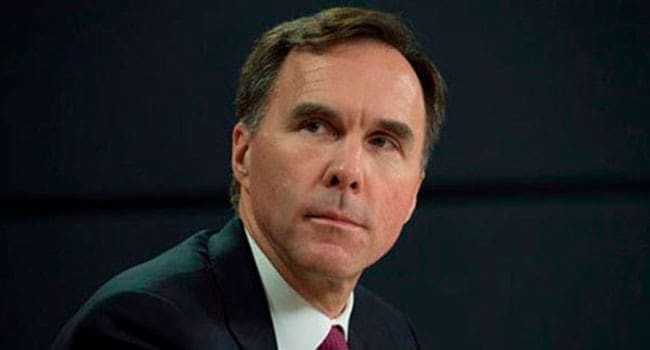 Federal Finance Minister Bill Morneau’s proposal to eliminate tax loopholes for small business has been both widely discussed and heavily criticized. This isn’t surprising when you consider it could have a detrimental economic effect on everyone from doctors to farmers.
Federal Finance Minister Bill Morneau’s proposal to eliminate tax loopholes for small business has been both widely discussed and heavily criticized. This isn’t surprising when you consider it could have a detrimental economic effect on everyone from doctors to farmers.
But one component has been mysteriously absent from this conversation: Morneau’s plan is actually anti-egalitarian.
Merriam-Webster defines egalitarianism as “a belief in human equality especially with respect to social, political, and economic affairs,” and “a social philosophy advocating the removal of inequalities among people.”
The political left (Liberals, New Democrats, Greens) strongly supports egalitarian principles. The political right (Conservatives, Libertarians) strongly supports personal liberty and freedom. It doesn’t mean either side vehemently opposes the other’s core beliefs, but that they view the world with very different political lenses.
How is the Liberal tax reform plan anti-egalitarian?
While Canadians dislike paying income tax, they mostly recognize there’s no way to completely avoid it. Hence, our country’s two major political parties, the Liberals and Tories, have strategically fought for lower tax rates, maintaining current tax rates, or justifying minimal tax increases for a garden variety of reasons (i.e. the public good, cost of living index, safety and security measures, etc.).
Tax loopholes have always been a more difficult issue for the major parties to tackle. While this concept is neither egalitarian nor freedom-loving, it’s often seen as a way for large corporations, small businesses and individuals to avoid paying tax on some of their hard-earned money through legal, non-confrontational means.
Closing loopholes is, therefore, more of a political benefit than an economic benefit. It’s easier for a politician to publicly call for the removal of tax loopholes than it is to implement this policy.
The Liberals are fully aware of this. They receive political and financial support from wealthy donors as well as small business owners. Both groups benefit from logical tax cuts and questionable tax loopholes, and don’t want to see the well dry up in either case.
Political consultant Gerry Nicholls pointed out on CTV News Channel’s Power Play on Sept. 8 that the Liberals initially tried to use “class war rhetoric” to sell their message to Canadians. He’s right but when the economic classes began to realize the rhetoric was being used against them, they went to war against the Liberals.
Why? It became painfully clear Morneau’s proposal wasn’t just an economically egalitarian plan to soak the rich (which is politically viable for this government). It would also affect small business owners like farmers and convenience store proprietors. The political narrative suddenly shifted to how the federal Liberal government was hurting the middle class’s financial future, rather than plugging up tax loopholes and creating more equality in the system.
Ottawa originally held firm and pointed out that a 75-day consultation period was in effect. But within days of growing criticism from all sides of the political fence, Prime Minister Justin Trudeau started hinting at the possibility of tweaking Morneau’s proposal.
This was an early sign that Liberal mandarins realized their tax reform plan had gone too far.
Morneau received this message loud and clear, too. In his Sept. 10 interview with CTV News’s Evan Solomon, he suddenly claimed this plan “isn’t about small business” and his government has “no intention of trying to make it more difficult for the family farm.”
Yeah, sure. Shall we put on another tap dance number for the minister to try out?
Morneau and the Liberals made a huge tactical error in assuming that closing tax loopholes would unite party supporters and Canadians behind their plan. They should have realized the political messaging model behind tax fairness and tax benefits is very different.
Instead, they got caught with their political pants down and anti-egalitarian flies open. And it shows.
Michael Taube, a Troy Media syndicated columnist and Washington Times contributor, was a speechwriter for former prime minister Stephen Harper. He holds a master’s degree in comparative politics from the London School of Economics.
The views, opinions and positions expressed by columnists and contributors are the author’s alone. They do not inherently or expressly reflect the views, opinions and/or positions of our publication.

